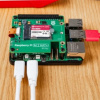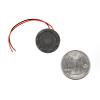×
SparkFun will be closed on Tuesday, November 5th to support our team in being able to go out and vote! Orders placed after 2 pm MT Monday, November 4th will ship on Wednesday, November 6th. Thanks for your patience and understanding.
When we originally wrote our Beginning Embedded Electronics tutorials, our hope was that they would help people to get started in electronics. We realized, however, that it might be helpful to take another step back and talk about some of the real foundations of embedded electronics.
So check it out - the Bite-Sized Primer section of our tutorials. We believe these tutorials will really help clarify some of the tough terms you might hear in electronics. Additionally, as we mentioned in our original Free Day post, there is a quiz aspect to this Free Day. Let's just say...studying these tutorials might be beneficial if you want to do well on the Free Day quiz. Ok, not "might be beneficial" - the quiz questions will come from these tutorials, so read them!
Right now, we have added 17 18 new small tutorials (with more on the way) that talk about things like doing number system conversions, using pull-up resistors, performing simple soldering, and a whole bunch of other useful information.
What are TX and RX Signals?
We think these tutorials are a great way to learn about some of the cornerstones of working with electronics and are great for beginners and veterans alike. And don't forget - Free Day is just around the corner...time to get studying!







Just don't make any tutorials about resistance. It's futile.<br />
Don't panic. We won't.
I have gotten a metric TON of use out of the SparkFun B.E.E. (buzz?) tutorials, and I am sure the Bite-size tutorials will be another helpful addition.<br />
<br />
I'd like to add that if you are interested in books on the subject, I would recommend "Practical Electronics for Inventors" by Paul Scherz. I was very impressed by how thorough and clear the book was on everything you could think of in electronics.
Given so many positive comments, maybe we could encourage SparkFun to start carrying that book. ;) (Honestly, I'm not affiliated with the book at all, i just think it should be on SparkFunion's shelves).
Funny you should mention this book; I just picked up the second edition about two weeks ago. It's a great book! It's cleared up some things I thought I knew/understood and reinforced others.<br />
<br />
;-> (cjh)<br />
I also have that book and it does a great job of explaining how components work and what kind of applications they have.<br />
<br />
Many engineers have theoretical knowledge, but when it comes to implementing the theory, they have no clue what kinds of parts are available or where to find them.
Be good to mention about DTE and DCE terms when taking about TX and RX lines.<br />
<br />
On Data Terminal Equipment (DTE) the TX line is an output (transmitted data) and RX line is received data (an input). <br />
<br />
However on Data Communications Equipment (DCE), like a modem or radio modem, the TX line is the transmitted data (an input) and the RX line is received data (an output). This is often not the case in all modems and it can be quite confusing. <br />
<br />
So TX and RX don't indicate if a line is input or output, when its a good ideal to mark the lines as an output or input.<br />
<br />
In RS232, when you connect a DTE to a DCE your connecting the TX line to a TX line and RX to RX, just to confuse things.
These are awesome, I think its a great idea to post these little tutorials on things people take for granted, like soldering basics, ADC, etc..
Maybe it's just me.. but I think the tutorials should be structured. Just like that tree control for products. One node would be theory and under you find the laws. Another one passsive components with rezistor and capacitor. Provide links between them (like KLV link on limiting current for a led). Also allow a search for keywords that would 'pull up' tutorials related. Also each 'leaf' could have levels (beginer, advanced...)<br />
A good tutorial on tranzistors... please? (I cannot understand the ratings to save my life, but I know that I need a digital on/off switch in a 5V circuit)<br />
Other than that great job. Learned most of what I know from you guys. (I think I learned alot: from wondering how stuff works to making a roaming, sonar based, bluethooth, PC controlled, PIC asm programmed soon to be my vacumm cleaner robot)<br />
THANK YOU.
Muchas Gracias el pedido llego sin problemas.<br />
Paying people to learn. Nice!
I recommend people read them and make comments on any additions to the tutorials. The tutorials do a great job on explaining concepts, but some lack detail or reasoning.<br />
<br />
For example, the Voltage Divider tutorial does a great job explaining why it works, but fails to explain that it also adjusts the current depending on the resistors used.
this is why they are bite-sized. they are the first nibble of information.
Which is it, byte size or nibble?
That may be, but how much are really worth? It could be anything from 0 to 15!<br />
(supposed to be "How much are they really worth")
Thank you so much! :-) "Can I have some more tutorials please?" ;-)
The way you play the game, and arrange incentives, product offering and customer support in a coherent concept. Kudos. I hope you are contageous and this approach takes a viral run. (last year, I enjoyed Free Day even if I didn't participate)
These are great. There aren't many places where these basic lessons can be found together. It's all stuff I already know from school but they are all great for a someone just starting.
These tutorials are great. Thank you and please continue!